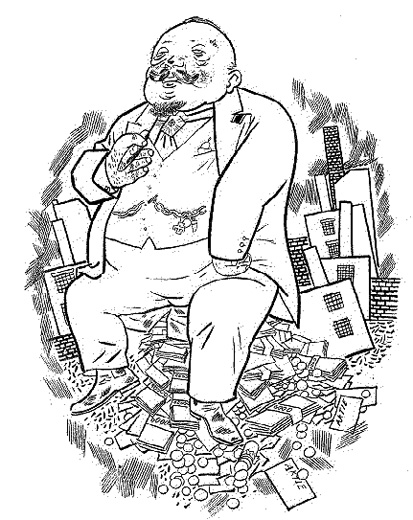
When I say the word capitalist, I mean a certain kind of person: not a small-business owner or a start-up entrepreneur, although they, too, fall under the broad umbrella of that definition.
Who I’m really talking about are people whose lives are based on the pursuit of profit by any means possible – and who fight creating a moral and democratic basis for that wealth.
A restaurant manager, a gun store owner, a small farmer, a used car salesman, a realtor, a motorcycle mechanic, and a pharmacist are all, narrowly speaking, capitalists.
They’re out to make a sale, to support themselves and their families, and often they want to expand their business. Some would like to eventually leave their business to their children.
This is one reason why it’s such a misconception to claim that socialism and communism are about taking and then redirecting all profit and all wealth. After all, many of the businesses mentioned above and others like them are under considerable pressure today from huge corporate competitors. Big Business receives tax breaks and legal advantages not available to ordinary people. Small businesses have more in common with their employees than they may realize.
Any business, large or small, faces the same challenge of how to best utilize their work force and their resources. As with referees in a close basketball game, when they blow the call, more than the single player is impacted.
A farmer, for instance, who has access to a large amount of groundwater, may have the legal right to sell as much as he wants to drilling interests. But in states such as California and Texas, that right ends up harming the farmer’s neighbors and surrounding communities. In a time of chronic droughts, that farmer is hurting the greater good, and eventually himself and his family. Maybe he’s under pressure because the giants of agribusiness have pushed so many small farmers into a financial corner.
Whatever the reason, the farmer’s choice changes him from being an ordinary small businessman into a profit addict. He didn’t properly value the needs of his family and his community. He’s become a toxic kind of capitalist.
Opposing that type of business practice isn’t only socialist and communist thinking, it’s common sense. You’re looking after your neighbors as well as yourself.
If your workers are genuinely involved in the decision-making process, if you’re providing a safe workplace, if you welcome labor unions, and if you’re wisely using natural resources at your disposal, then you’re still a capitalist-but the healthier kind.
Socialism and communism are not based on theft. They’re not about targeting every business owner for takeover. At heart, they’re about allowing those responsible for making profits a role in deciding how those profits are used.
Capitalism is a flame that flickers wildly. Sometimes it goes out, or sometimes it burns down a field. In the current system, in an “anything goes” business climate, letting a farmer drain his well might seem like a decision best left to him-until you’re his neighbor, desperately trying to put out a fire.
That’s why, when you use the word capitalist, make sure the person to whom you’re talking knows what kind of company you’re describing.
The larger the company, the more opportunity for risk to the community, and the more chances for people getting burned – which requires more vigilance by the workers involved and their neighbors, who, after all, are selling them the products and services those workers need.
Apologists like to claim that corporations are people, yet the ones making critical decisions are a bare handful at the top of the ladder, while those impacted by those decisions number in the millions. The few rule the many.
When I say the word capitalist, I don’t mean devil or vampire. Basing your life on making profits has a moral meaning beyond yourself and your family. Your failure or success at ethical bookkeeping tells me what kind of capitalist you are: toxic or healthy.
Yet, even if you’re playing by both the moral and legal rulebook, the current system can still snuff out your candle or burn down your field. Making millions of people pay for your failures – as with the 2008 banking meltdown – shows us that at its heart global capitalism hates government except when it’s in trouble; hates taxes unless the money goes to its pet interests; despises improving public works unless the project directly helps its company.
Do you work at a healthy place? Whether the workplace is big or small, the same question, and the same solutions: worker participation, responsible management, and a healthy environment for both its workers and neighbors.
Image: The Capitalist by George Grosz, labeled for non-commercial re-use with modification.

MOST POPULAR TODAY


Zionist organizations leading campaign to stop ceasefire resolutions in D.C. area

High Court essentially bans demonstrations, freedom of assembly in Deep South

Afghanistan’s socialist years: The promising future killed off by U.S. imperialism

Communist Karol Cariola elected president of Chile’s legislature






Comments